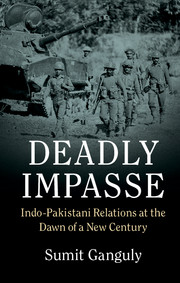Book contents
- Frontmatter
- Dedication
- Contents
- List of maps
- Preface and acknowledgments
- List of abbreviations
- 1 The rivalry revisited
- 2 Kargil and after
- 3 The troubled decade in Kashmir
- 4 The road to Operation Parakram
- 5 The composite dialogue and beyond
- 6 An extension of the rivalry
- 7 Policy implications
- In lieu of an epilogue
- Appendices
- References
- Index
Preface and acknowledgments
Published online by Cambridge University Press: 05 March 2016
- Frontmatter
- Dedication
- Contents
- List of maps
- Preface and acknowledgments
- List of abbreviations
- 1 The rivalry revisited
- 2 Kargil and after
- 3 The troubled decade in Kashmir
- 4 The road to Operation Parakram
- 5 The composite dialogue and beyond
- 6 An extension of the rivalry
- 7 Policy implications
- In lieu of an epilogue
- Appendices
- References
- Index
Summary
This manuscript has had a long gestation period. The original idea stemmed from a plan to update my previous book, The Crisis in Kashmir: Portents of War, Hopes of Peace. However, my imaginative and supportive editor at Cambridge University Press, Edward Parsons, upon reading my proposal suggested that I write a wholly new book. His generous suggestion led to the genesis of this book. It does not merely seek to update developments in Kashmir but instead attempts to probe what ails the Indo-Pakistani relationship and prevents a resolution of the long-standing dispute. It argues that the two parties are not on an equal footing; Pakistan is the revisionist state in this relationship and India is the status quo power. This argument is not a normative statement; instead it is merely the description of an empirical reality.
I am deeply grateful to a number of individuals who have read and commented on the manuscript. My most able, thoughtful and generous critics are two former doctoral students, Nicolas Blarel and Manjeet Pardesi. Both of them read the manuscript with care, proffered important theoretical and substantive suggestions and forced me to clarify my arguments in various places. Colonel David O. Smith, a friend of many years, who served twice as the United States Defense Attaché in Islamabad, Pakistan, also provided timely, thoughtful and trenchant comments on this manuscript. Professor Robert Jervis, who has long been a staunch intellectual supporter, read the manuscript with much care and provided me with extensive and perspicacious comments. Finally, I wish to thank an anonymous reviewer for Cambridge University Press who provided critical, but entirely helpful, suggestions for improving the manuscript. The usual caveats apply.
I also wish to thank the following individuals for their assistance. My research assistant, Brandon Miliate, proofread this manuscript with care, pitched in as needed to track down errant endnotes, and created the bibliography and appendices. Karen Stoll Farrell, the Librarian for South and Southeast Asia at the Wells Library and Indiana University, Bloomington helped locate relevant documents in a most timely fashion. Her colleague, Theresa Quill, the Social Sciences and GIS Librarian, worked closely and attentively with me to create the accompanying maps. Jack Renner, an intern at the Center on American and Global Security at Indiana University Bloomington, carefully constructed the economic data charts.
- Type
- Chapter
- Information
- Deadly ImpasseIndo-Pakistani Relations at the Dawn of a New Century, pp. ix - xPublisher: Cambridge University PressPrint publication year: 2016

